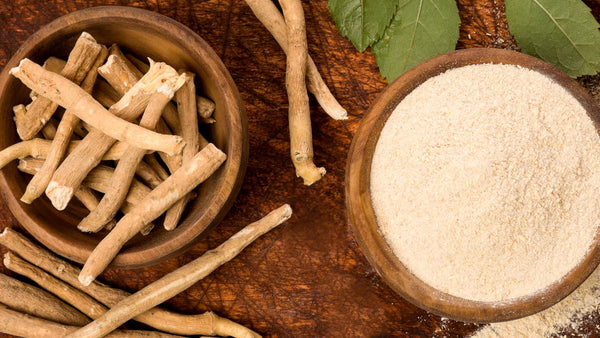Ayurveda is an Indian system of alternative medicine that is based on the concepts of natural healing. Ashwagandha is one of the most essential herbs in the Ayurvedic system.
Ashwagandha has been utilized by humans for the reduction of stress, the enhancement of energy levels, and the improvement of concentration for thousands of years.
The name "Ashwagandha" comes from the Sanskrit word for "smell of the horse," which refers to both the aroma of the herb and its possible capacity to make one more powerful.
Its scientific name is Withania Somnifera, although it is also known as "Indian ginseng" and "winter cherry," amongst other names. Its botanical name is Withania Somnifera.
The ashwagandha plant is a small shrub with yellow flowers that’s native to India and Southeast Asia. Extracts or powder from the plant’s roots or leaves is used to treat a variety of conditions, including anxiety and fertility issues.

Therefore, it is essential to have a solid understanding of the foods that foster a healthy gut microbiome to maintain the microbiome in a balanced and healthy state.
Nutrition Profile of Ashwagandha
Ashwagandha is packed with essential nutrients, including important vitamins and minerals. Some of the nutrients present in this plant include vitamin C, Iron, and Calcium.
A 100-gram serving of ashwagandha consists of the following quantities of nutrients:
- Energy: 245 Kcal
- Carbohydrate: 49.9 gm
- Dietary Fiber: 32.3 gm
- Protein: 3.9 gm
- Iron: 3.3 mg
- Calcium: 23 mg
- Vitamin C: 3.7 mg
As scientists from all around the world continue to investigate ashwagandha's potential to treat a wide range of illnesses, the field of research on this plant continues to advance.
Here are a few of the key benefits of ashwagandha that are supported by scientific research.
Ashwagandha helps Relieve Stress & Anxiety
The ability of ashwagandha to relieve stress is probably what has brought it the most fame. This benefit has been shown in several studies, which have found that using ashwagandha considerably reduces the levels of stress and anxiety experienced by study participants.
One study suggested that ashwagandha can improve the quality of sleep as well; researchers confirmed that subjects slept significantly better with doses of the herb compared to placebo doses.

Ashwagandha helps Increase Muscle & Strength
The effectiveness of ashwagandha in increasing both strength and muscular size is still the subject of ongoing research. According to the findings of one study, participants reported increases in both their speed and their strength.
Consumption of ashwagandha resulted in an improvement in muscle power, as well as a lower percentage of total body fat and lower levels of cholesterol, according to the findings of another study. Although some participants reported improved sleep quality, this study did not evaluate ashwagandha use with a control group receiving a placebo.
In a separate study that only included male volunteers, ashwagandha treatments produced excellent outcomes. When compared to the group that was given a placebo, the men who were given ashwagandha experienced significant reductions in body fat percentage and post-workout muscle damage, as well as significant increases in muscle strength (as measured by exercises such as the bench press and leg extensions), as well as significant gains in muscle size in their arms and chests.

Ashwagandha helps Improve Sexual Function in Women
Clinical research suggests that ashwagandha may be beneficial for women who are dealing with sexual dysfunction. According to the participants' reports, the consumption of ashwagandha led to considerable improvements in arousal, lubrication, orgasm, and overall satisfaction.
Additionally, it greatly enhanced the amount of successful sexual encounters, as well as the measures of anxiety surrounding their sexual life and sexuality.

Ashwagandha helps Improve Athletic Performance
Ashwagandha has been proven to have potentially favorable benefits on athletic performance, suggesting that it may be a desirable supplement for athletes to take.
In one review of the research, the participants were men and women who took ashwagandha in doses ranging from 120 mg to 1,250 mg per day. The trials were conducted in 12 different countries. The findings indicate that the herb may improve various aspects of physical performance, such as strength and oxygen consumption during exercise.
Ashwagandha supplementation resulted in a significant increase in healthy people's and athletes' maximum oxygen consumption (VO2 max), according to a meta-analysis of five separate investigations.
A person's VO2 max is the greatest amount of oxygen that they can use when engaging in strenuous activity. It is a measurement of the fitness of the heart and lungs.

Athletes and non-athletes alike must have a VO2 max that is at its ideal level. A VO2 max that is too low is related to an increased risk of death, whereas a VO2 max that is too high relates to a reduced risk of cardiovascular disease.
In addition to this, there is some evidence that ashwagandha can assist boost muscular strength.
In one study, male volunteers who took 600 milligrams of ashwagandha per day and participated in resistance training for eight weeks showed considerably larger gains in muscle strength and size when compared with a group that was given a placebo.
Ashwagandha Boosts Fertility and Testosterone Levels in Men
There is some evidence that consuming ashwagandha can enhance male reproductive health. It has been demonstrated that restoring a healthy level of reproductive hormones in infertile men using ashwagandha results in a significant improvement in the quality of their sperm. According to the findings of one study, 14% of the female spouses of male patients were pregnant.
In a separate study involving ashwagandha and stress, researchers discovered that the herb enhanced testosterone levels in male individuals but had no effect on the levels of testosterone in female participants]. Another study that looked at the effects of ashwagandha on muscle strength in men found that there was a considerable rise in testosterone levels.

Ashwagandha helps Improve Brain Function and Memory
There is some evidence that consuming ashwagandha can aid improve cognitive function, memory, and the capacity to carry out motor actions after being instructed. During cognitive and psychomotor tests (which measure one's ability to respond to instructions and perform an action that is indicated), ashwagandha was found to significantly improve participants' reaction times when compared to a placebo. These tests measured the ability to respond to instructions and perform the action that was indicated.
According to the findings of one study, ashwagandha was able to considerably increase the participants' attention spans, as well as their short-term and long-term memories across several different tests.
Ashwagandha helps Improve Sleep
There have been a few preliminary investigations that point to ashwagandha having potential advantages for sleep.
One recent study involving 150 people who had trouble sleeping discovered that those who took a supplement consisting of 120 mg of standardized ashwagandha extract once daily for six weeks reported a 72 percent improvement in the quality of their sleep, whereas those who didn't take the herb only reported a 29% improvement in the quality of their sleep.

One more study including 80 participants indicated that those who took ashwagandha for eight weeks reported increases in the quality of their sleep, mental alertness, and other measures. These changes were most noticeable in participants who had insomnia at the beginning of the study.
The effects of ashwagandha may be caused by the plant's presence of triethylene glycol, which is a chemical that has been demonstrated to promote sleep. It is also rich in withanolides, which are compounds that appear to influence the body's ability to cope with stress. Stress is known to have detrimental effects on the quality of sleep and to increase daytime sleepiness. Withanolides appear to alter the ability of the body to cope with stress.

An ancient medicinal plant, ashwagandha is thought to provide a variety of advantages to one's health.
According to the conclusions of various studies, it may be beneficial for lowering levels of anxiety and tension, promoting restful sleep, and even improving cognitive functioning in certain groups.
Most people can consume ashwagandha without any significant adverse effects. Before including ashwagandha into your diet, however, it is essential to have a conversation with a qualified medical practitioner because the herb is not suitable for everyone.


